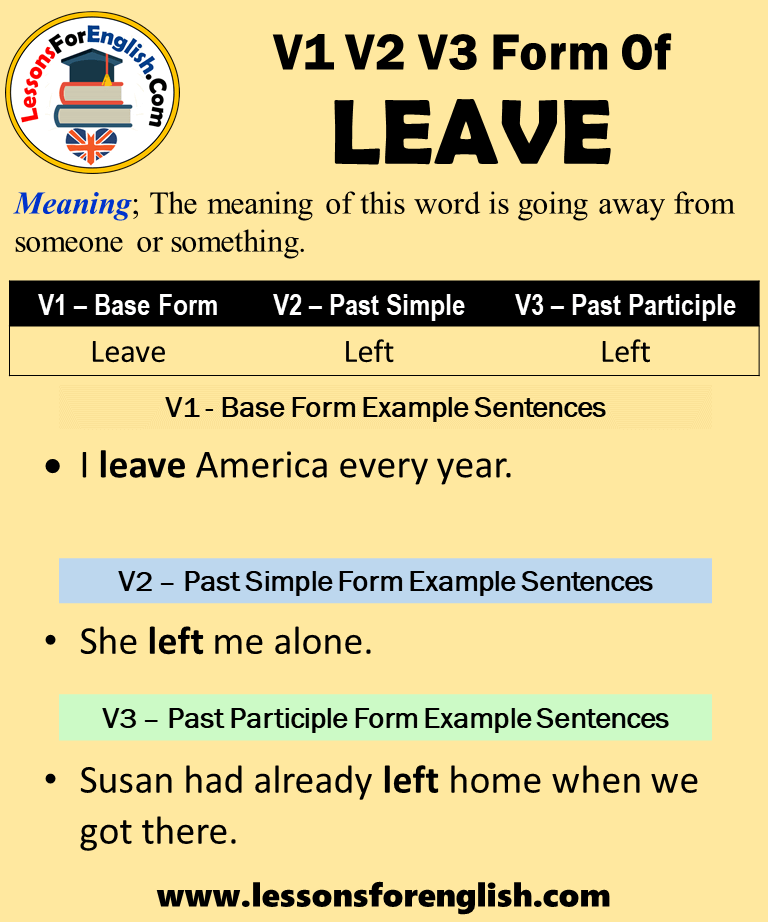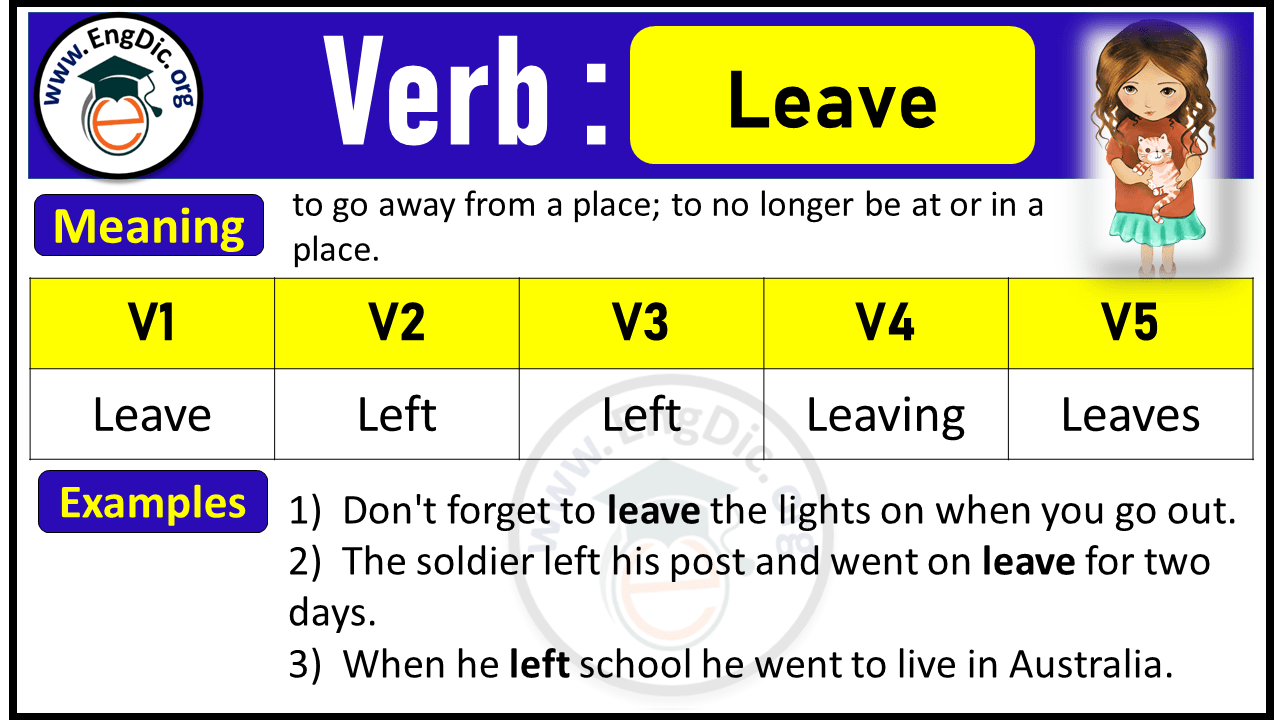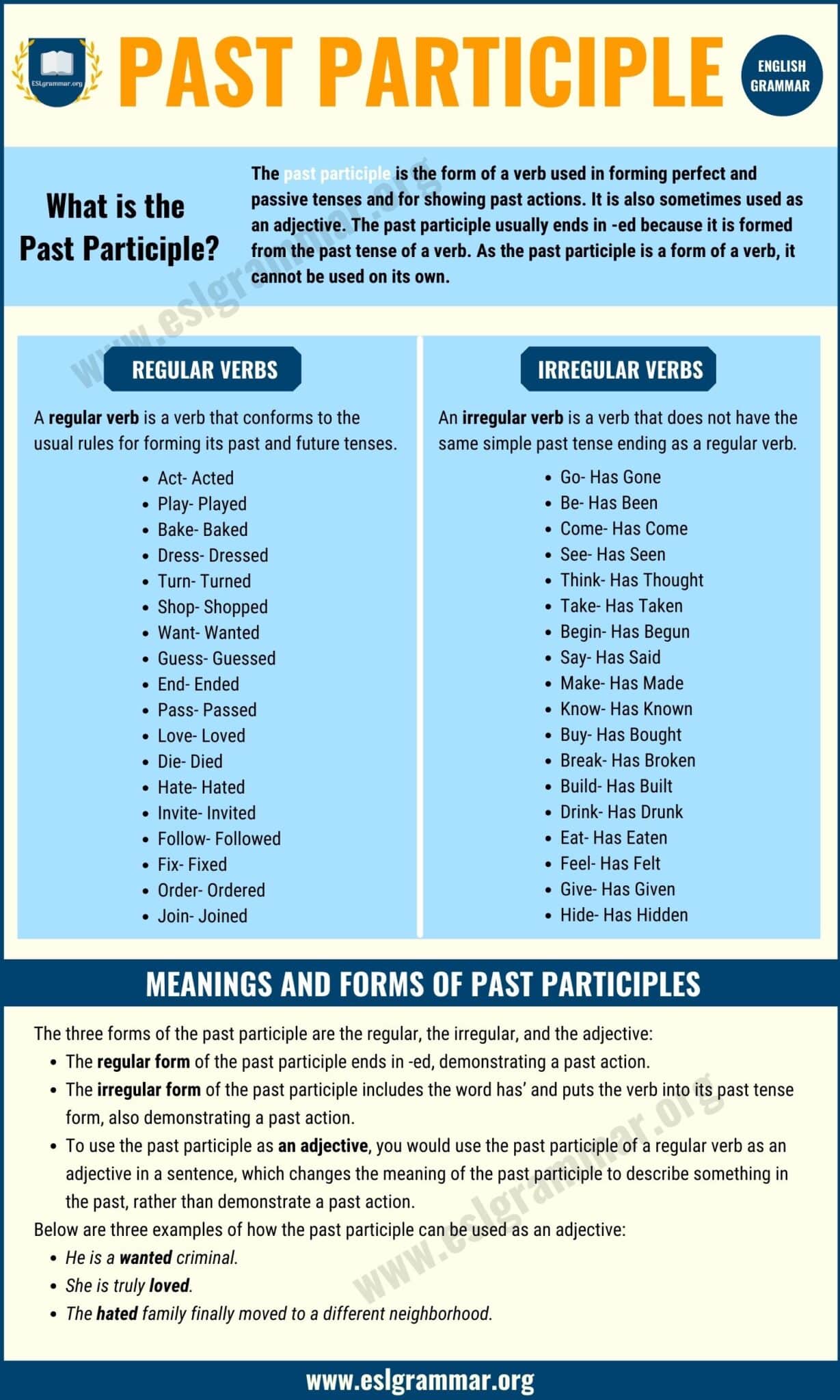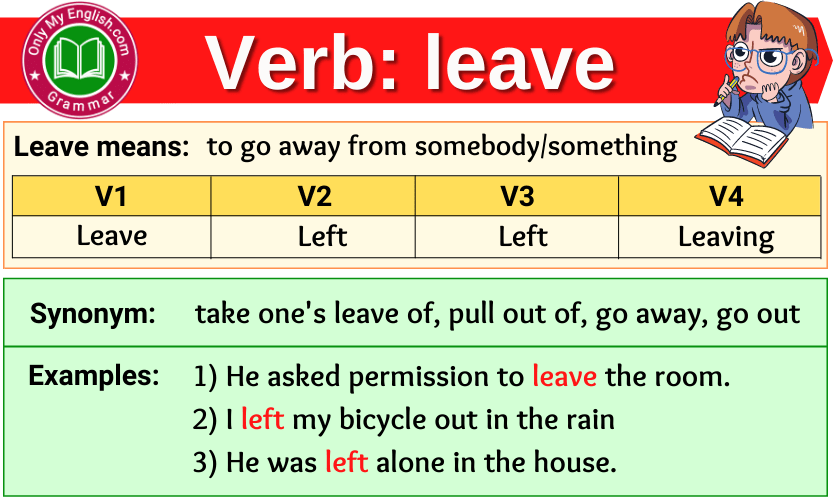
Leave V1 V2 V3 V4 V5 , Past Tense, Past Participle Form of Leave EnglishAwesome
What is the past tense of the word "leave" The past tense (past participle) form of "leave" is "left." The infinitive of the word form is "leave." The present participle form is "leaving." The past tense form is "left" and past participle form is "left." Understanding verb tenses The general grammar rules that govern past tenses are as follows.

Leave Past Tense Best English Listening Podcast English Made Simple
A past participle is a word formed from a verb that can be used as an adjective or to form verb tense. Most past participles end -ed, -d, -t, -en, or -n.. I hope that, when I leave this planet, I will have touched a few people in a positive way. (Actor Will Rothhaar) Forming the Past Participle (Regular Verbs).

Past Tense Of Leave, Past Participle Form of Leave, Leave Left Left V1 V2 V3 Lessons For English
'to leave' conjugation - English verbs conjugated in all tenses with the bab.la verb conjugator. bab.la - Online dictionaries, vocabulary, conjugation, grammar.. Past participle. left. Translations for "to leave" Translations for "to leave" in our English dictionaries "to leave" Spanish translation

Conjugación Leave 🔸 Verbo inglés en todos los tiempos y formas Conjugar en pasado, presente y
Most verbs have a past tense and past participle with -ed: worked played listened But many of the most frequent verbs are irregular: Irregular verbs Average Give it 1/5 Give it 2/5 Give it 3/5 Give it 4/5 Give it 5/5 Average: 4 (495 votes) ‹ Verb phrases Up Questions and negatives › Do you need to improve your English grammar?

Leave Past Simple, Past Participle, V1 V2 V3 Form of Leave English Vocabs
At this point, you may pose the relevant question: "What is the past tense of leave?" because "leaving" is not the base form. Indeed, "leaving" is the present participle form of "leave". "Left" is the correct response, which is spelled L-E-F-T. Amazingly, leave in past participle share the same form and pronunciation. Keep.

Simple Past Tense of Leave
Leave V1 V2 V3 V4 V5, Past Simple and Past Participle Form of Leave. When learning English you need to know the meaning of certain words first, and then sort the words appropriately according to grammatical rules. Verbs in a regular structure can be transformed with a simple rule, whereas in irregular verbs, this situation is slightly different.

Leave Past Tense, Present and Future Conjugations, Leave V1 V2 V3 in 2022 Past tense, Simple
English leave Infinitive to leave Preterite left Past participle left Model : leave Auxiliary : have, be Other forms: leave oneself / not leave Contractions Advertising Indicative Present I leave you leave he/she/it leaves we leave you leave they leave Preterite I left you left he/she/it left we left you left they left Present continuous

List of Past Participle Grammar Syntax
The English verb 'leave' is pronounced as [li:v]. Related to: irregular verbs. 3 forms of verb leave: Infinitive (leave), Past Simple - (left), Past Participle - (left).. Here are the past tense forms of the verb leave. 👉 Forms of verb leave in future and past simple and past participle. What is the past tense of leave.

Leave past participle EngDic
What is the past participle of "leave"? English Grammar Tenses Past. 1 Answer Diego Martínez Paz Jun 11, 2017 Left. Explanation: Examples:-David had/has left the building.-Nothing was left behind the door. Answer link. Related questions. Is past perfect the same as past participle?.

Leave Past Tense Verb Forms, Conjugate LEAVE
Simple Past Tense He/She/It left. I left. You/We/They left. Past Continuous Tense He/She/It was leaving. I was leaving. You/We/They were leaving. Past Perfect Tense He/She/It had left. I had left. You/We/They had left. Past Perfect Continuous Tense He/She/It had been leaving. I had been leaving. You/We/They had been leaving. Simple Future Tense

Past Tense of Leave, Past Participle of Leave, V1 V2 V3 V4 V5 Form of Leave Leave means; Go away
Irregular Verbs List Definition: To Leave Irregular verb: To Leave Verb conjugation: Leave - Left - Left Meaning of 'To Leave' To go out of a place Conjugation of verb 'Leave' Subscribe to Ad-Free Browsing Enjoy a seamless learning experience without interruptions from advertisements.

Leave Verb Forms, Base Form, Past Tense, Past Participle & V1 V2 V3 English Bodh
The past simple and the past participle of leave. Conjugation of the verb leave: Base Form/Infinitive without 'to': leave. Past Simple: left. Past Partciple: left. Present Partciple: leaving. Third Person Singular: leaves. Definition: 1. To go away from. 2. Not to take something or someone with you when you go

Past Participle Meanings and Different Forms of Past Participles ESL Grammar
Table of irregular verbs - English Grammar Today - a reference to written and spoken English grammar and usage - Cambridge Dictionary

Little Moon Leave PresentPastPast Participle TenseVerb Forms YouTube
Conjugate the verb leave in all tenses: present, past, participle, present perfect, gerund, etc.

Past Participle Definition, Forming Rules and Useful Examples • 7ESL
The Verb "Leave" in English Conjugation of "To Leave" The verb "leave" is an irregular verb. (This means that "leave" does not form its simple past tense or its past participle by adding "-ed" or "-d" to the base form.) The Five Forms of "To Leave" "To Leave" in All the Tenses

Leave Verb Forms Past Tense, Past Participle & V1V2V3
Hi there! The past participle is left. Experience - IELTS, OET, CAEL, CELPIP, TOEFL, CAE, FCE, C2, PTE, SAT, DIGITAL SAT, TOEIC, APTIS, GMAT, DUOLINGO. BUSINESS + TRAVEL ENGLISH, from BEGINNER about a year ago. Hi Learners Feel free to sign up with tutors here at Preply and they will help you achieve your learning goals. Best Regards.